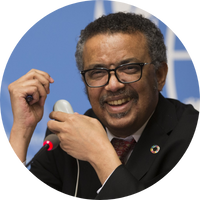New manifesto aims to addresses disastrous impact of armed conflict on cancer care

2 August, Brussels: The Emergencies and Crises Network of the European Cancer Organisation (ECO) was established to help create more resilient healthcare systems that can effectively respond to future crises. This network acts as a vital platform where cancer professionals and patient advocates can exchange ideas, learn from past emergencies, and propose best practices – quickly.
Today, Prof Mark Lawler, Co-Chair of the Emergencies and Crises Network, and Prof Andreas Charalambous, Past President of the European Cancer Organisation, are amongst a group of international experts publishing the 'Improving Cancer Care in Conflict-Impacted Populations' manifesto in The Lancet.
Network members convened for an emergency meeting triggered by last month's Russian missile strike on Kyiv's Okhmatdyt Children's Hospital. In light of the approaching release of the Manifesto, the agenda included how to address immediate challenges in patient care as well as firsthand accounts from healthcare professionals and patient representatives working in conflict zones.
More about the manifesto from Mark Lawler, Co-Chair of the Emergencies and Crises Network:
A team of international cancer leaders have published a manifesto that highlights the immediate course of action needed to address the detrimental effects of armed conflict on cancer care, treatment and prevention.
The manifesto, titled Manifesto on Improving Cancer Care in Conflict-Impacted Populations, has been published today in The Lancet.
Increasingly, as wars across the world continue to escalate, people with cancer face an ever-growing series of urgent challenges in conflict-affected regions, falling victim to the collateral damage of war on hospitals, on the healthcare supply chain and the massive displacement of patients that war creates.
The authors call for international collaboration to develop context-specific cancer services in acute humanitarian emergencies and in long-term conflict settings such as Ukraine and Palestine. They hope this manifesto will deliver immediate solutions that address the needs of the millions of cancer patients worldwide who are displaced by the consequences of war.
The manifesto sets out seven key priorities to ensure cancer services are preserved during conflict, including that the Geneva Convention is fully respected in protecting medical personnel, in prohibiting attacks against medical units, and in preserving the rights of sick people, including those diagnosed with cancer.
The experts also recommend the creation of a working group through the World Health Organisation (WHO), to implement and monitor cancer care in conflict-affected populations, including through cancer research.
 Professor Mark Lawler, Professor of Digital Health at Queen’s University Belfast, Co-Chair of the newly established European Cancer Organisation’s Focu Topic Network on Emergencies and Crises and co-author of the manifesto, said: 'The recent barbaric attack on the Okhmatdyt Hospital, the largest children's cancer treatment centre in Ukraine, emphasises the enormous damage that war can wreak on cancer patients and cancer health systems.'
Professor Mark Lawler, Professor of Digital Health at Queen’s University Belfast, Co-Chair of the newly established European Cancer Organisation’s Focu Topic Network on Emergencies and Crises and co-author of the manifesto, said: 'The recent barbaric attack on the Okhmatdyt Hospital, the largest children's cancer treatment centre in Ukraine, emphasises the enormous damage that war can wreak on cancer patients and cancer health systems.'
'Our seven-point manifesto recognises that context-specific solutions will be required across different settings. Exemplars such as the Ireland – Northern Ireland – US National Cancer Institute Consortium emphasise how international collaboration can empower delivery of the health dividend of peace. We will not waiver from supporting cancer patients in conflict-affected regions of the world. If we do not act as a matter of urgency, many more innocent victims will die.'

Commenting on the Manifesto, Dr Tedros Adhanom Ghebreyesus, the Director-General of the World Health Organization (WHO) and a co-author on the paper said: ‘Cancer doesn’t stop during humanitarian emergencies, but ensuring continuity of cancer care is extremely challenging when health systems and services break down during conflict and other crises. In February this year, WHO hosted a global meeting on non-communicable diseases in humanitarian settings in Copenhagen, drawing attention to the need to build resilient health systems that can deliver essential services for cancer and NCDs, even in the most difficult circumstances.’

Senior author Jemma Arakelyan, CEO at the Institute of Cancer and Crisis said: 'The manifesto emphasizes the urgent need for international collaboration to develop and deliver specific cancer care services in acute humanitarian emergencies and protracted conflict settings, as well as supporting the implementation of pragmatic research to improve the understanding of patient needs and provide guidance for the design of specific care models.'
 Her Royal Highness Princess Dina Mired of Jordan, the Honorary President of the European Organization for Research and Treatment of Cancer (EORTC), Patron of the International Society of Paediatric Oncology (SIOP) and a co-author, said: 'We urge all stakeholders to come together to make this manifesto a reality. Cancer patients have long been ignored in conflict settings and now with the current situation for cancer patients in Gaza for example, the situation has manifested itself in its extreme form. The global health community, as first line defenders of health and well-being for all, should collectively voice their solidarity in the strongest of terms for the sanctity and protection of health services, as well as for the establishment of clear cancer care models to protect cancer patients during any conflict.'
Her Royal Highness Princess Dina Mired of Jordan, the Honorary President of the European Organization for Research and Treatment of Cancer (EORTC), Patron of the International Society of Paediatric Oncology (SIOP) and a co-author, said: 'We urge all stakeholders to come together to make this manifesto a reality. Cancer patients have long been ignored in conflict settings and now with the current situation for cancer patients in Gaza for example, the situation has manifested itself in its extreme form. The global health community, as first line defenders of health and well-being for all, should collectively voice their solidarity in the strongest of terms for the sanctity and protection of health services, as well as for the establishment of clear cancer care models to protect cancer patients during any conflict.'
Improving Cancer Care in Conflict-Impacted Populations: seven steps outlined by the manifesto
- First, to advocate and demand unequivocally that the Geneva Convention is fully respected and without permissive policies, in protecting medical personnel, in prohibiting attacks against medical units, and in preserving the rights of sick people, including those diagnosed with cancer.
- Second, to promote the inclusion of cancer and other non-communicable diseases (NCDs) in humanitarian settings into the political agendas of the United Nations, including the fourth high level meeting on NCDs.
- Third, to create a working group through WHO, to define and support implementation and monitoring of approaches to maintain cancer care in conflict-affected populations, including through research.
- Fourth, to advance inclusive strategies and care models for cancer patients in humanitarian settings, addressing the complexity of cancer, the specific requirements for palliative care, and the distinct needs of different age groups, including children with cancer and blood disorders.
- Fifth, to develop and support implementation of context-specific strategies to deliver better cancer care for conflict-impacted populations, by establishing online coordination platforms, mechanisms for blended financing, and priorities for technical support.
- Sixth, in cooperation with key stakeholders, to publish a report on the state of cancer care in conflict-affected regions once every 2 years, including progress updates in particular settings, emerging best practices, and recommendations, and incorporate such content into relevant WHO reports, such as the WHO Global Status Report on Cancer 2025.
- Seventh, to establish cancer care as a core pillar of an emergency response plan in all conflict settings and request due investments in cancer services to promote access, rebuild cancer care infrastructure, and coordinate workforce capacity-building, including by international cooperation.


